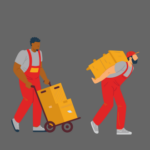
Ecommerce has become an integral part of our lives, revolutionizing the way we shop and do business. As technology advances and consumer behaviors shift, the ecommerce landscape continues to evolve at a rapid pace.
From innovative technologies to changing consumer preferences, staying ahead of the curve is essential for businesses to thrive in this dynamic environment.
Let’s explore some of the key trends shaping the future of ecommerce retail.
Rise of big players
Global powerhouse companies are revolutionizing the retail sector and causing ripples in a variety of other industries. Amazon continues to be neck and neck with Walmart as the world’s largest retailer.
Fueled by online shopping and an efficient just-in-time operations structure, Amazon and other retail firms emulating their model, have contributed to a surge in growth. According to a recent report, global online retail sales are expected to grow from $4.4 trillion this year to $6.8 trillion by 2028 at an 8.9% compound annual growth rate.These changes have greatly impacted other industries as well. High-volume ecommerce order-fulfillment processes have significantly affected the shipping industry. There is a higher demand for fast and free shipping, which is great for shipping companies, but poses a challenge for ecommerce businesses operating with slim profit margins. These big players have pushed everyone to meet new consumer demands but also to modernize and embrace new technology.
But what does this all mean for retail staffing?
Increasing demand
The need for people in areas such as order fulfillment, inventory management, warehousing, shipping and delivery has exploded in recent years. The success of Amazon and other ecommerce companies has created the need for many qualified candidates to meet the demands of surging ecommerce sales.
According to Shopify’s Michael Keenan, “Two years ago, only 17.8% of sales were made from online purchases. That number is expected to reach 20.8% in 2023, a two percentage point increase in ecommerce market share. Growth is expected to continue, reaching 23% by 2025, which translates to a 5.2 percentage point increase in just five years.”
Now operations need to find qualified employees to fulfill these growing consumer demands.
The impact of AI + automation
In ecommerce logistics, operational agility is a game-changer for businesses. Operational agility entails efficiently managing a company’s orders, inventories, and other operational aspects. The key to achieving this is through automation. Technological advancements, including machinery, software, and AI-powered integrations, have provided several viable solutions for automating ecommerce logistics.
By automating critical functions such as order processing, inventory synchronization, and fulfillment routing, business owners can focus on executing their core business strategies with the confidence that their operational tasks are being managed effectively and accurately.
For retail staffing, this means a few things. For most operations, technology only helps automate repetitive functions so that employees can do their jobs better and with ease. For other operations, automation and AI may take over more and more of their warehouse but it increases the need for automation and AI-specific roles (because technology can and will break) or to train machines on the specific functions of that operation. While it might lead to some fluctuations at first, there is so much demand, it is unlikely it will take over too many jobs long term.
Sustainability and ethical consumption
As consumers become more environmentally conscious and socially aware, there is a growing demand for sustainable and ethically sourced products. E-commerce retailers are responding to this trend by incorporating eco-friendly practices into their supply chains, offering environmentally friendly products, and transparently communicating their sustainability efforts to customers. Brands that prioritize sustainability not only appeal to conscious consumers but also contribute to positive social and environmental impact.
The ecommerce retail staffing landscape is continually evolving, driven by technological advancements, shifting consumer behaviors and changing market dynamics.
To succeed in this competitive environment, businesses must adapt to emerging trends, embrace innovation and prioritize customer-centric strategies.
By staying updated on the latest developments and capitalizing on new opportunities, e-commerce retailers can position themselves for success in the digital age.
Need help getting your retail or ecommerce operation up to speed? SIMOS can help increase productivity and efficiency within your operation. Click here to learn more about our solutions or get in touch with our team.



